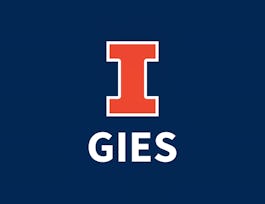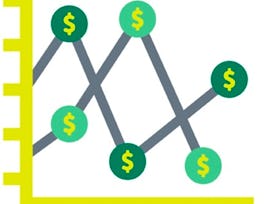Good decision making and strategy do not exist in isolation: the success and profitability of a business depend not only on the organization’s own strategic moves but also on those that other firms make, especially competitors. Understanding the strategic linkages among firms can therefore be immensely valuable. Economics and Game theory offer tools that can specifically enhance one's understanding and ability to exploit such strategic linkages. This course will cover one of the most crucial decisions that a firm offering a differentiated product needs to make – how to price its product. In addition, the course will demonstrate some of the consequences of governments and platforms intervening in markets, either because markets may have failed or because the rule-maker may have been persuaded to intervene by key stakeholders. Importantly, the course will layer game-theoretic considerations on top of economic considerations in the marketplace.



Business Economics and Game Theory for Decision Making


Dozenten: Liad Wagman
2.487 bereits angemeldet
Bei  enthalten
enthalten
(29 Bewertungen)
Empfohlene Erfahrung
Was Sie lernen werden
The economic concept of elasticity, and how to utilize it in making informed decisions on pricing products.
Sources of market power and how firms with market power set prices, segment customers, and customize prices to different segments.
Concepts in game theory, including simultaneous games, sequential games, auctions, and adverse selection issues.
Kompetenzen, die Sie erwerben
- Kategorie: Pricing
- Kategorie: Microeconomics
- Kategorie: Business Strategy
- Kategorie: Competitiveness
- Kategorie: Market (Economics)
Wichtige Details

Zu Ihrem LinkedIn-Profil hinzufügen
21 Aufgaben
Erfahren Sie, wie Mitarbeiter führender Unternehmen gefragte Kompetenzen erwerben.


Erwerben Sie ein Karrierezertifikat.
Fügen Sie diese Qualifikation zur Ihrem LinkedIn-Profil oder Ihrem Lebenslauf hinzu.
Teilen Sie es in den sozialen Medien und in Ihrer Leistungsbeurteilung.

In diesem Kurs gibt es 6 Module
Welcome to Business Economics and Game Theory for Decision Making! Module 1 introduces the concept of elasticity, and specifically, price elasticity of demand, which quantifies the intricate relationship between price changes and buyer behavior. Price elasticity of demand measures the responsiveness of consumer demand to fluctuations in product prices. Understanding elasticity is paramount in economics, as it empowers businesses and policymakers to make informed decisions regarding dynamic pricing strategies, revenue optimization, and resource allocation. By calculating and analyzing the elasticity of demand for various products, economists can identify the optimal price points that maximize profitability and market efficiency. This module explores some of the foundations of price elasticity and its applications, to provide the requisite infrastructure for further study in subsequent modules, as we aim to navigate the complex landscape of pricing in today's dynamic markets.
Das ist alles enthalten
8 Videos5 Lektüren4 Aufgaben1 Diskussionsthema
Module 2 delves into the complex relationship among governments, platforms, businesses, and consumers, shedding light on the profound impacts of policy interventions on various stakeholders. In an increasingly interconnected world, government policies and platform regulations wield immense influence over market dynamics. This module explores how these interventions can lead to clear winners and losers among businesses, consumers, and society at large. Moreover, it delves into the strategies and tactics employed by firms to actively influence and shape market policies to their advantage. By examining actual policy scenarios, learners will gain an understanding of the multifaceted interactions within modern markets, the pivotal role played by government and platforms in shaping their outcomes, and the high potential for unintended consequences from market intervention.
Das ist alles enthalten
7 Videos4 Lektüren4 Aufgaben
Module 3 begins to cover a crucial component of strategy – pricing – by directly solving a profit maximization problem. Market power enables firms to set prices and influence consumer choices to a substantial degree. This module delves into the complexities of optimal pricing in a number of scenarios, providing a foundation for concepts such as price discrimination, monopolistic competition, and strategic pricing. Learners will gain insights into the potential trade-offs between profit maximization and consumer welfare, as well as the economic and ethical implications of firms wielding substantial pricing authority. By examining actual scenarios, this module equips students with the analytical tools and knowledge needed to begin to navigate the challenging terrain of pricing strategies.
Das ist alles enthalten
7 Videos5 Lektüren4 Aufgaben
Module 4 continues the coverage of optimal pricing with market power by providing a second, dynamic and iterative approach that firms employ in determining product pricing – by tying together the concepts of elasticity and profitability. As a result, the module offers profound insights into the dynamic world of pricing strategies. In today's complex and diverse markets, businesses must tailor their approaches to meet the varying needs and preferences of different consumer groups. This module explores the fundamental concept of market segmentation, by which firms identify and categorize distinct customer segments based on factors such as demographics and behaviors as a means of price customization, where pricing strategies are adapted to align with the unique characteristics and willingness-to-pay of each segment. This module equips learners with the knowledge and skills to craft effective pricing strategies that maximize profitability, integrating all of the previously covered concepts in the course into a single, simple rule that is employed by sophisticated firms to price optimally and dynamically: The Optimal Markup Rule.
Das ist alles enthalten
5 Videos4 Lektüren4 Aufgaben
Module 5 serves as a capstone in the economics sequence – ending where the sequence began – providing students with a compelling framework for understanding strategic decision-making, including pricing, in a wide range of contexts. Non-cooperative game theory, which analyzes the strategic interactions and choices of economic agents such as individuals and firms within competitive settings, is essential for fostering an understanding of how economic agents make decisions that impact outcomes. This module introduces students to the key concepts and principles of game theory, such as Nash equilibrium, dominant strategies, and information asymmetries, while exploring its applications in economics, business, and policy. Students will develop the analytical skills needed to assess and predict outcomes in simple strategic interactions, connecting together all of the concepts from the economics sequence into a single framework.
Das ist alles enthalten
7 Videos4 Lektüren4 Aufgaben
This module contains the summative course assessment that has been designed to evaluate your understanding of the course material and assess your ability to apply the knowledge you have acquired throughout the course.
Das ist alles enthalten
1 Aufgabe
Dozenten


Empfohlen, wenn Sie sich für Business Essentials interessieren

University of Illinois Urbana-Champaign

Howard University

University of Virginia

University of Rochester
Auf einen Abschluss hinarbeiten
Dieses Kurs ist Teil des/der folgenden Studiengangs/Studiengänge, die von Illinois Techangeboten werden. Wenn Sie zugelassen werden und sich immatrikulieren, können Ihre abgeschlossenen Kurse auf Ihren Studienabschluss angerechnet werden und Ihre Fortschritte können mit Ihnen übertragen werden.¹
Warum entscheiden sich Menschen für Coursera für ihre Karriere?




Bewertungen von Lernenden
29 Bewertungen
- 5 stars
79,31 %
- 4 stars
10,34 %
- 3 stars
3,44 %
- 2 stars
0 %
- 1 star
6,89 %
Zeigt 3 von 29 an
Geprüft am 29. Dez. 2023
I think the game theory section could have used a bit more explaining, but overall I learned a great deal in this class and would recommend it to anyone!

Neue Karrieremöglichkeiten mit Coursera Plus
Unbegrenzter Zugang zu 10,000+ Weltklasse-Kursen, praktischen Projekten und berufsqualifizierenden Zertifikatsprogrammen - alles in Ihrem Abonnement enthalten
Bringen Sie Ihre Karriere mit einem Online-Abschluss voran.
Erwerben Sie einen Abschluss von erstklassigen Universitäten – 100 % online
Schließen Sie sich mehr als 3.400 Unternehmen in aller Welt an, die sich für Coursera for Business entschieden haben.
Schulen Sie Ihre Mitarbeiter*innen, um sich in der digitalen Wirtschaft zu behaupten.
Häufig gestellte Fragen
Access to lectures and assignments depends on your type of enrollment. If you take a course in audit mode, you will be able to see most course materials for free. To access graded assignments and to earn a Certificate, you will need to purchase the Certificate experience, during or after your audit. If you don't see the audit option:
The course may not offer an audit option. You can try a Free Trial instead, or apply for Financial Aid.
The course may offer 'Full Course, No Certificate' instead. This option lets you see all course materials, submit required assessments, and get a final grade. This also means that you will not be able to purchase a Certificate experience.
When you purchase a Certificate you get access to all course materials, including graded assignments. Upon completing the course, your electronic Certificate will be added to your Accomplishments page - from there, you can print your Certificate or add it to your LinkedIn profile. If you only want to read and view the course content, you can audit the course for free.
You will be eligible for a full refund until two weeks after your payment date, or (for courses that have just launched) until two weeks after the first session of the course begins, whichever is later. You cannot receive a refund once you’ve earned a Course Certificate, even if you complete the course within the two-week refund period. See our full refund policy.

